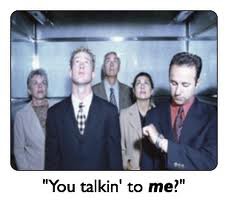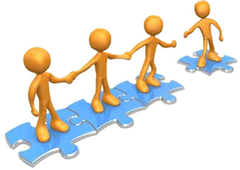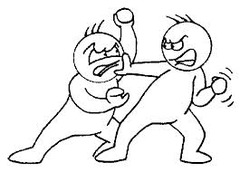Chapter 10 – Social Psychology – Definitions & Examples – Flashcards
Unlock all answers in this set
Unlock answersquestion
The scientific study of how we think about, influence, and relate to one another.
answer
Social Psychology
question
Deals with the ways in which we think about other people and ourselves.
answer
Social Cognition
question
An evaluative belief that we hold about something.
answer
Attitude
question
Social pressures that serve to modify our thought and/or behavior.
answer
Social Influence
question
The idea that we strive to have attitudes and behaviors that do not contradict one another.
answer
Cognitive Consistency
question
A theory that predicts that we will be motivated to change our attitudes and/or behaviors to the extend that they cause us to feel dissonance, an uncomfortable physical state.
answer
Dissonance Theory
question
A type of social influence in which someone tries to change our attitudes.
answer
Persuasion
question
When people make decisions based upon factual information, logical arguments, and a thoughtful analysis of pertinent details.
answer
Central Route to Persuasion
question
Occurs when people are influenced by incidental cues, such as a speaker's attractiveness
answer
Peripheral Route to Persuasion
question
The process by which a person uses behavior and appearance of others to form attitudes about them.
answer
Impression Formation
question
The act of assigning cause to behavior.
answer
Attribution
question
An attribution that assigns the cause of a behavior to the traits and characteristics of the person being judged.
answer
Trait Attribution
question
Assigning the cause of a behavior to environmental factors.
answer
Situational Attribution
question
The tendency to attribute other people's behavior to dispositional (internal) causes rather than situational (external) causes.
answer
Fundamental Attribution Error
question
A culture, like many Western Cultures, in which individual accomplishments are valued over group accomplishments.

answer
Individualistic Culture
question
A culture, like many Asian Cultures, in which group accomplishments are valued over individual accomplishments.
answer
Collectivistic Culture
question
Our tendency to make the fundamental attribution error when judging others, while being less likely to do so when making attributions about ourselves.

answer
Actor/Observer Bias
question
People's tendency to ascribe their positive behaviors to their own internal traits, but their failures and shortcomings to external, situational factors.
answer
Self-Serving Bias
question
A preconceived negative judgment of a group and its individual members.
answer
Prejudice
question
A generalized belief about a group of people.
answer
Stereotype
question
The behavioral expression of a prejudice.

answer
Discrimination
question
Consists in avoiding interaction with someone of another race or ethnicity.
answer
Aversive Racism
question
A phenomenon in which fear of being discriminated against elicit stereotype-confirming behaviors.
answer
Stereotype Threat
question
Tendency to favor one's own group over other groups.
answer
In-Group Bias
question
Tendency to view all individuals outside our group as highly similar.
answer
Out-Group Homogeneity
question
The theory that prejudice stems from competition for scarce resources.
answer
Realistic-Conflict Theory
question
An out-group that is blamed for many of society's problems.
answer
Scapegoat
question
The theory that under certain conditions, direct contact between antagonistic groups will reduce prejudice.
answer
Contact Hypothesis
question
A goal that is shared by different groups.
answer
Superordinate Goal
question
Closeness.
answer
Proximity
question
Resemblance.
answer
Similarity
question
Drawn to appealing physical appearance.
answer
Physical Attractiveness
question
The idea that males and females of approximately equal physical attractiveness are likely to select each other as partners.

answer
Matching Hypothesis
question
Unwritten rule or expectation for how group members should behave.

answer
Norm
question
Tendency of a group or team to stick together.

answer
Cohesiveness
question
Behaving in accordance with group norms.
answer
Conformity
question
The tendency to go along with the group in order to fulfill the group's expectations and gain acceptance.
answer
Normative Conformity
question
Conformity that occurs when conformity pressures actually persuade group members to adopt new beliefs and or attitudes.
answer
Informational Conformity
question
A state in which a person's behavior becomes controlled more by external norms than by the person's own internal values and morals.
answer
Deindividuation
question
Performing better on a task in the presence of others than you would if you were alone.
answer
Social Facilitation
question
Members of a group decrease the pace or intensity of their own work with the intention of letting other group members work harder.
answer
Social Loafing
question
The mode of thinking that occurs when the desire for harmony in a decision-making group overrides a realistic appraisal of alternatives.
answer
Groupthink
question
A form of compliance that occurs when people follow direct commands, usually from someone in a position of authority.

answer
Obedience
question
Yielding to a demand.
answer
Compliance
question
Getting people to agree to a small request, then following up with a larger request.
answer
Foot-in-the-door Compliance
question
Asking people for a big request, and after they refuse ask for something smaller.

answer
Door-in-the-face-Compliance
question
The obligation to return in kind what another has done for us.
answer
Reciprocity
question
Increasing compliance by first getting the person to agree to a deal and then changing the terms of the deal to be more favorable to yourself.
answer
Low Balling
question
Before a decision, the person who is persuading you throws in something else (i.e "we'll add in another sham-wow for free if you call right now").
answer
That's-not-all
question
Obedience to immoral, unethical demands that cause harm to others.
answer
Destructive Obedience
question
The use of foot-in-the-door compliance in an obedience situation to get people to obey unceasing demands.
answer
Slippery Slope
question
The degree to which one can disassociate oneself from the consequences of his/her actions.
answer
Psychological Distance
question
Aggression motivated by the desire to obtain a concrete goal.

answer
Instrumental Aggression
question
Aggression that is meant to cause harm to others.

answer
Hostile Aggression
question
States that we are more likely to respond to others aggressively whenever we are feeling negative emotions, such as being tired, sick, frustrated, or in pain.
answer
Cognitive Neoassociation Theory
question
Behavior that helps others.
answer
Prosocial Behavior
question
Helping someone in trouble with no expectation of reward and often without fear of ones own safety.
answer
Altruism
question
Another term for altruism.
answer
Helping Behavior
question
The tendency for any given bystander to be less likely to give aid if other bystanders are present.
answer
Bystander Effect
question
The idea that responsibility for taking action is diffused across all the people witnessing an event.
answer
Diffusion of Responsibility
question
The case in which people think that everyone else is interpreting a situation in a certain way, when in fact they are not.
answer
Pluralistic Ignorance



